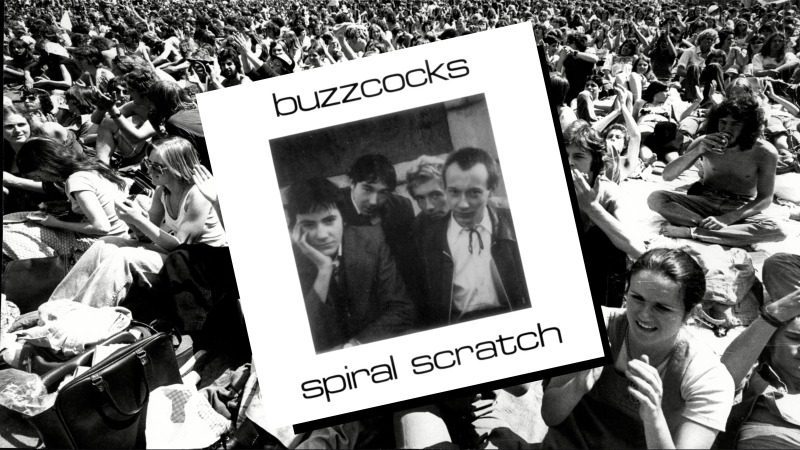It’s amazing the places a song can lead you to. I don’t remember the year, but at some point I heard Orange Juice’s “Rip It Up” and wound up at “Boredom.” The guitar riffs were identical, the “you know this scene is very humdrum” line was verbatim. Edwyn Collins and his pals had plum ripped off Buzzcocks and it sounded delicious. I became a Buzzcocks fan right there, in the clutter of another band’s thievery. Singles Going Steady called out to me and I answered; but now, at the ripe old age of twenty-seven, I’m more often renting a room in the fidgety, messy, 10-minute punk fiasco of the Spiral Scratch extended play, released independently in 1976. I dig the rough-draft sounds of a band figuring out how to be band and figuring it out fast.
But first, let’s go back a year: Buzzcocks formed in Bolton, once an old mill town full of Flemish weavers and then a boomtown of textile manufacturers before the first World War, in Greater Manchester. A student at the town’s technology institute, Howard Trafford, was an electronic music buff and started looking for someone to play the Velvet Underground’s “Sister Ray” with him. That’s how he met Peter McNeish, a lad in a different rock and roll band called Jets of Air. Upon their collision, something potent was in the air. So Trafford changed his name to Howard Devoto, and McNeish went by Pete Shelley. They called themselves “Buzzcocks” because of a Time Out article titled “It’s the Buzz, Cock!” and thought it’d fit in well with the local punk scene. (It didn’t hurt that Shelley worked at a porno shop sometime before then.) They did some shows with a stand-in bass guitarist named Garth Davies and a local chap, Black Cat Bone’s Mick Singleton, behind the kit.
What really got Devoto and Shelley going was a New Music Express review of the Sex Pistols’ debut gig in late 1975. They hitched it to High Wycombe to catch Johnny Rotten and his coterie of punk urchins perform, inevitably liking the music so much that they booked the Sex Pistols to play at the Lesser Free Trade Hall after. But they could sense that, in order to play more serious rooms, Buzzcocks needed to lock in its personnel. In came bassist Steve Diggle and drummer John Maher, and then came opportunities to open for the Sex Pistols in Manchester and the Clash in London in 1976. In-between shows, they recorded an 11-track demo at Stockport Studios. But it was a day at Dave Kent-Watson’s Manchester studio Indigo Sound that proved to be the most fruitful, as Buzzcocks got in touch with a then-unknown producer Martin Hannett to record four songs onto a 16-track Ampex tape. They spent three hours laying down the notes and then another two at the mixing table. What came of it—Spiral Scratch—was a great introduction to the band, among the best ever.
Buzzcocks were right there at the dawn of British punk rock; “Anarchy in the U.K.” was a couple of months old when Spiral Scratch got made. There was only one problem: Buzzcocks didn’t have label money to distribute their music. They borrowed 750 pounds from friends and family to pay manufacturing costs and started their own “label,” New Hormones. An initial run of a thousand copies sold out fast. By the time that first wave of interest ran out, Spiral Scratch had already sold 16,000 copies, most by mail order and many through the Manchester branch of Virgin. You can trace the next ten, twenty years of DIY labels in Manchester and Liverpool all the way back to Spiral Scratch and New Hormones. Bob Last’s Fast Product label and its catalogue of early Human League, Gang of Four, and Dead Kennedys records especially owed a lot to Devoto and Shelley. “People were buying Spiral Scratch for the sheer fact of its existence, its existence as a cultural landmark and portent of revolution,” Simon Reynolds wrote in his book, Rip It Up and Start Again.
Spiral Scratch is definitive because “Boredom” exists; that song alone powers the project. When Domino Record reissued the EP in 2018, they called it “the most important record ever,” seemingly putting its superiority to “Anarchy in the U.K.” and “New Rose” and “White Riot” in writing: “It is a celebration of that ‘can-do’ spirit—illustrating the power of unharnessed teenage energy and naivety achieving so much with so little resources, and providing the inspiration to young people of their, and every other subsequent generation.” Funny then that even Shelley admitted once that he and the band “didn’t think there’d be any future” for punk rock. But these tea-drinking Mancs created something necessary out of thin air, in only a few hours’ time. And it was practically an accident, cast into an all-consuming world of big, proggy sagas and radio-safe, singer-songwriter ilk.
I like what Paste writer Matt Melis said about Spiral Scratch in 2024, when we named it the second-best EP of all time: “…Spiral Scratch survives as one of the earliest British punk records and the first to be released on a punk band’s own indie label. Not a shabby legacy for four little, jittery, anxious songs about being bored to death with zero prospects.” Devoto certainly doesn’t shy away from the malaise, riffing about “standing in the standing room,” “smoking in the smoking room,” and “dying in the living room” on the rowdy, head-pounding “Time’s Up.” Likewise, the guitars chug and clang in a whoosh of feedback on the adrenaline-pissing “Friends of Mine,” a song that hits with such a gnarly, restless bravado that Devoto may have imagined it being some gross, fabled inverse to the Band’s “The Shape I’m In.” And the humor is full-on, in waggish images of trimming nails with pliers and having a poolside think about “foreign matters and fancy affairs.”
The Sex Pistols’ arrival may have opened the door for Joy Division and the Fall, but Buzzcocks’ music has aged far better. I think Never Mind the Bollocks is a terribly droll record. Beautiful gowns, etcetera. But Spiral Scratch, Singles Going Steady, and, hell, Love Bites are all far more interesting. “I’m falling into fancy fragments, can’t contain myself” is a great line, sung by Devoto at the top of “Breakdown” while Shelley’s crushing guitar barely keeps pace with Maher’s palsied drumming. Maybe Spiral Scratch wasn’t supposed to be good on purpose, but Devoto and Shelley’s short-lived but kindred collaboration (Devoto would exit the band in 1977 because of the “clean old hat” he thought punk rock had become) splashed with burned-out and burned-up intensity. They proved that genius ain’t always the most obvious thing. Spiral Scratch isn’t garish or taut, but a poorly-recorded riot that’s inspired thousands of agitated and anxious blokes here in the States, across the pond, and in other worlds completely. And the EP’s legacy gets shouted by Devoto near its beginning: “It’s plenty trouble.”
Matt Mitchell is Paste’s music editor, reporting from their home in Los Angeles.




